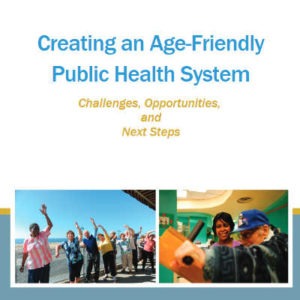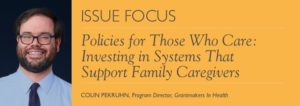Latest Resources
Creating an Age-Friendly Public Health System: Challenges, Opportunities, and Next Steps
National, state, and local public health officials; aging experts, advocates, and service providers; and health care officials came together to discuss how public health could contribute to an age-friendly society and improve the health and well-being of older Americans.
Health Affairs: Community Care for High Needs Patients
Almost everyone wants to live in their own home and community as they age. Yet for many, later age brings frailty and the accumulation of chronic conditions. This month’s issue of Health Affairs examines how we can best provide care in the community for people with advanced illness.
Suicide in Older Adults: A Quiet Epidemic
There is a widespread and dangerous popular misconception that permeates our society that aging and despair—and even depression—go hand in hand. One of the most drastic consequences of such marginalization is the resultant isolation and feelings of burdensomeness that, when exacerbated with key risk factors, may drive suicide in older adults.
Policies for Those Who Care: Investing in Systems That Support Family Caregivers
Across the country, more than 45 million family members are providing care for older adults with chronic, disabling health conditions. There are a multitude of reasons why health grantmakers should be concerned about this, ranging from caregivers’ critical role in managing the needs of complex care patient populations to the manifold short- and long-term impacts caregiving has on the health and wellness of caregivers themselves.
Join the Age-Friendly Health Systems Movement
The Age-Friendly Health Systems initiative is an opportunity to build, together, more effective health systems that reliably deliver on the promise of better care for older adults.
New Tools to Combat Ageism
The idea that we live in a rapidly aging society is not news, but here is an important fact: in ten years (by 2030), the United States will have more people over the age of 65 than children under 18 for the first time in its history. And yet, our society has not responded to the opportunities or the challenges that this change provides.
Trends in Health Philanthropy: The Challenge of Family Caregiving
Every day, millions of Americans provide unpaid care to a family member. A few years ago, it was estimated that 43.5 million adults had provided care for someone in the previous 12 months, with most caring for other adults, fewer for children, and a small percentage for both age groups.
Connect With Funder Peers on Older Adults
Interested in exchanging strategies, information, and questions with your funder peers? Sign up for GIH E-Forums.








